For most of us, flying airplanes and dealing with the airline companies is a necessary evil to experience travel. And when things go wrong, it can create a really negative experience (being stranded at an airport in a foreign country for example).
Being out of pocket as a result of an airline’s blunder is an even worse feeling. And particularly in Canada where we only have two major carriers in Air Canada and WestJet, it can feel like you are at the mercy of the airline’s policies.
Fortunately, it turns out that as airline passengers in Canada, we do have a set of legal rights established by the Canadian Transportation Agency (CTA) in the Air Passenger Protection Regulations (APPR), which includes your right to compensation in the case of numerous airline blunders causing flight disruptions, such as flight delays and cancellations, damaged or lost baggage, and other possible damages.
| Length of Arrival Delay | Compensation for Large Airlines | Compensation for Small Airlines |
|---|---|---|
| 3-6 hours | $400 | $125 |
| 6-9 hours | $700 | $250 |
| 9+ hours | $1,000 | $500 |
Of particular note, airlines are required to compensate you for flight delays that are deemed “within the carrier’s control” according to the above schedule. Note the differing compensation amounts depending on whether a large airline or a small airline.

Less fortunately, it turns out that the enforcement of these rights is subpar and the airlines do a pisspoor job of abiding by them, often outright trying to circumvent them in order to not compensate passengers. One common tactic they use is to claim a flight delay was due to factors outside the airline’s control, even when it clearly wasn’t the case.
This leaves the onus on you as a passenger to navigate a convoluted series of processes to get fairly compensated. In this article, we will guide you through different avenues for seeking APPR monetary compensation from Canadian airlines, including:
- Filing an APPR compensation claim directly with airlines
- Submitting an air travel complaint with the CTA
- Take civil action against the airline in small claims court
APPR compensation is a highly complex (and dynamic) topic, and each individual’s case will be different. I hope this article serves as a good framework and resource for you in seeking APPR compensation, but know that there is no one-size-fits-all formula. Only you can decide what is the best approach for your situation.

Preamble out of the way, let’s go about extracting our pound of flesh fair compensation from whatever airline is currently trying to violate your rights (:/).
Initial Process: File an APPR Claim with the Airline
No matter whether you intend to take further action via CTA or small claims, you must first file a claim for APPR compensation directly to the airline in question.
Even if the airline has stated or informed you that the flight/claim is not eligible for compensation, it’s still recommended to go through this process to have explicit documentation of the same, which you can later use as evidence of the airline disregarding APPR.
Step 1: File a Claim with the Airline Directly
There are two ways to go about filing your claim directly with the airlines – through their public-facing online forms, or via submitting in writing. Undoubtedly it is easier to submit via the online forms or via their customer service email, which can be located for each airline in the following tables:
Large Airlines
| Airline | APPR Claim Webpage | APPR Claim Email |
|---|---|---|
| Air Canada | Submit a claim with Air Canada | |
| WestJet | Submit a claim with WestJet | [email protected] |
Small Airlines
| Airline | APPR Claim Webpage | APPR Claim Email |
|---|---|---|
| Air Transat | Submit a claim with Air Transat | |
| Flair Airlines | None | [email protected] |
| Porter Airlines | Submit a claim with Porter | |
| Sunwing Airlines | Submit a claim with Sunwing | |
| Swoop | Submit a claim with Swoop |
However, it’s been speculated that submitting in writing may result in your claim being taken more seriously. As well, if you feel you have the right to significant damages that extend beyond the standard compensation amounts, you likely won’t be compensated for those by going through the primary channels.
Instead, you would craft a letter outlining the damages and the total amount you expect to receive in compensation. A nice template to start with has been created by the Air Passenger Rights Facebook group.
For claims submitted in writing, you can submit via a few different channels:
- If the airline’s online claim form accepts attachments, you can attach it there as a digital document. However, I find most airline web forms don’t accept attachments.
- Alternatively, submit the claim to the airline’s customer service email address (or official APPR address if they have one).
- You can send the letter to the airline’s recognized agent/attorney for service in your province. You can find these listed in this directory.
As for which is preferred, it is a bit situational. I would suspect that if you are submitting a letter, keeping it in physical form and submitting it to the attorney for service might have more impact, and also avoid a backlog of online processing that can happen when airlines have mass flight delays that affect many passengers at once.
We are curious to hear anyone’s experience in the comments when submitting their claim in writing to the airline.
Step 2: Receive a Response from the Airline
While you have a year to submit your claim to the airline, the airline has 30 days to respond to your claim. In my experience, the airlines have typically responded to my claim in a few weeks to right around 30 days’ time.
If you submitted an online claim form on the airline’s website, you will receive an email reply from the airline. See below for an example of a reply from WestJet awarding me $400 for a claim (to which I was actually entitled to $1,000).

If the response is a denial, you will want to save a hard copy of this for your records, as evidence that the airline denied your claim and the reasons they gave.
In the case of a denial, it’s easy to think that the airline’s decision is authoritative in its response, based on sound legal precedent, and that your case against them is unlikely to succeed. I can assure you this is far from reality. The airline’s decision-making for APPR claims ranges from intentionally sinister to disorganized incompetence.
For example, in my last claim with WestJet, I was on a WestJet flight delayed over 90 hours with several colleagues. All of us submitted the same claim for the same flight. We received the following heterogeneous responses:
- Denied all compensation: $0
- Approved for partial compensation: $400
- Approved for full compensation: $1,000
Conclusion: APPR claims directly with the airline are an utter crapshoot.
Step 3: Decide on Further Action
If your claim has been denied, you now have two options:
- Escalate your complaint with the CTA
- This simple process is designed to assign you an agent to appeal or evaluate your case against the airline in more detail and ensure the appropriate decision was made by the airline. In practice, the CTA is fairly ineffective, slow, and unlikely to result in APPR compensation, but it does happen on occasion.
- Take civil action against the airline in small claims court
- With this route, more work is required and it has associated modest legal costs ($200-$500), but depending on the strength of your case and the evidence you have, this process can give you a much higher chance of success in getting appropriate compensation.
This is where it comes down to a personal choice dependent on a lot of personal factors. Some questions to consider:
- How much money are you potentially eligible for in compensation?
- How much time are you willing to dedicate to pursuing compensation?
- How strong is your case that the flight delay or cancellation was within the airline’s control?
The more $$ you are eligible for, the more motivated you are, and the stronger your evidence, the more likely it is worth pursuing civil action, in my non-professional opinion.
Also keep in mind the current legal process and legal filing costs in your province (more on this later), as these add potential risks to the civil action route as well.
Here is a summary table to help you consider what avenue to take:
| Complaint via Canadian Transportation Agency | Civil Action Against the Airline (Province-Specific) | |
|---|---|---|
| Cost | $0 | $100+ |
| Amount of work required | Minimal – 5-10 minutes to complete form | Moderate – longer form, more documentation of evidence, mailing and affidavit |
| Turnaround time | Up to 18 months for initial review | 20-30 days |
| Likelihood of receiving a response | Low – backlog and many claimants never hear anything back | Mandatory – the airline must respond or receive the default judgment in your favor |
Next Step: Compile Evidence and Documentation
Regardless of what action you decide to pursue, you will want to have as much documentation as possible to support your claim. Document and save the following:
- Booking details (ticket, invoice, flight number, etc)
- Notifications of the flight disruption (delayed or canceled flight), including proof of the total delayed time and reasons given for the flight delay or flight cancellation.
- Proof of your contact with the airline (eg. a screenshot of the confirmation email received after submitting the online claim form on the airline’s website).
- Airline’s response in writing, denying your claim (if they did respond).
- Supporting receipts and invoices for costs incurred including hotel, meals, transportation, etc.
If going through small claims you will ultimately need physical copies of all of these documents as well. You may want to start a folder. Otherwise, digital copies and screenshots will suffice.
As well, you can take the time at this stage to write out a description of what exactly happened as you experienced it. Try to be objective and make direct reference to the APPR and the fact that the flight was delayed or canceled due to factors within the airline’s control (if you have evidence of this).
As an example, here is a recent description I used when escalating my case with the CTA:
“On November 6, 2022, WestJet canceled flight WS3342 from YQQ to YEG. After multiple delays, we were boarded onto the plane close to 10:00 PM, then informed we would not be flying. The flight was canceled due to factors within the airline’s control: a technical system outage across WestJet IT systems (“service outage”). We’ve included documentation of this outage occurring on November 5, 2022, as well as a letter written by WestJet COO on November 12, 2022, apologizing for the outage and admitting that it was within WestJet’s control.”
“It was clear WestJet knew that the delay would be greater than 3 hours, as evidenced by their emailing of a revised itinerary to me with a rebooked flight over 90 hours later on WS 3342 on November 10, 2022. Contrary to the APPR, they did not attempt to book me on a competing airline or provide me with an official reason for the cancellation. Instead, they tried to leave me stranded in Comox, BC for the entire week…“
“At the airport after we disembarked, we were told to find our own accommodation and transportation, and submit to WestJet for reimbursement. Thus we were expected to find a hotel late at night, while being out of pocket for meals, hotels, and transportation. Not wanting to miss a week of work and lost wages, and also knowing that airlines can be very underhanded at fairly compensating passengers, I arranged my own transportation home to YEG the following day via Air Canada from YVR.“
“As a result of all of the above, I incurred several expenses including transportation costs, meal costs, one night hotel stay, costs for a new return flight from YVR, and one day of lost wages. I submitted a claim to WestJet for compensation as well as reimbursement for out-of-pocket expenses. Contrary to APPR regulations for minimum compensation levels due to controllable delays (including $1000 for delays greater than 9+ hours), WestJet awarded me the incorrect compensation of $400, and denied my request for reimbursement of out-of-pocket expenses.”
Below this text, I then included an itemized list of expenses that I was seeking compensation for and the total amount.
The keys to success here are:
- Stating the exact flight details including the originally scheduled departure time and actual arrival time.
- Citing evidence that the flight delay was within the airline’s control (or lack of any communication regarding the reason for the flight delay).
- Citing the APPR regulations and specifically how the airlines were in violation of them.
- Adding some personal effects to show how harmful the experience was to you.
This isn’t an exact science to this process, but the more details you can provide, the better.
Next, proceed to either file a complaint with the CTA or take civil action using the legal process specific to your province.
Escalation Option 1: File a Complaint with the Canadian Transportation Agency
As mentioned above, filing a complaint with the CTA is the path of least resistance for those seeking compensation. For smaller claims or less assured claims, I would generally recommend this route.
To begin, you complete a form located here on the CTA website and include flight details, a description of the incident, and supporting documentation.
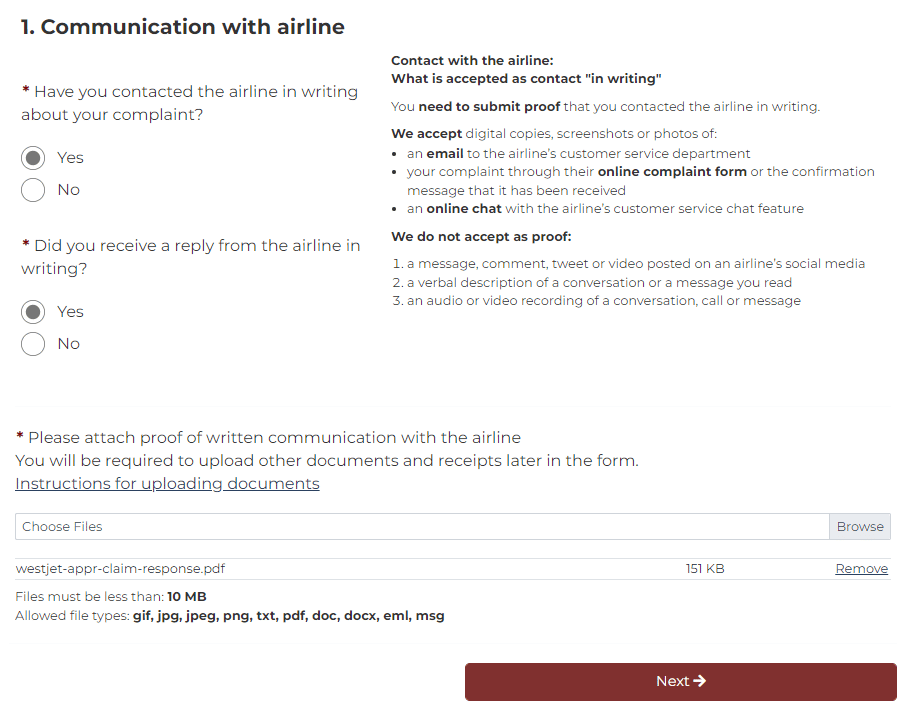
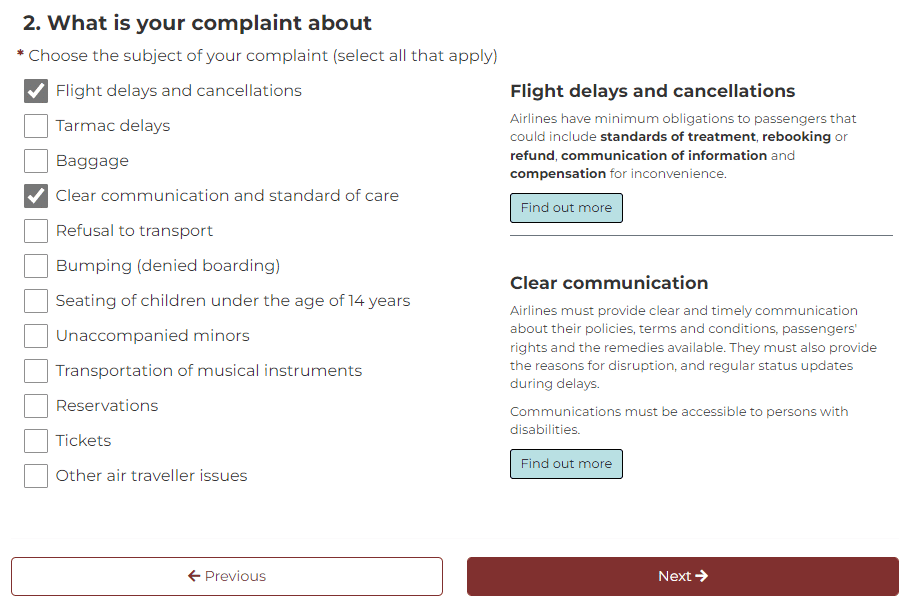
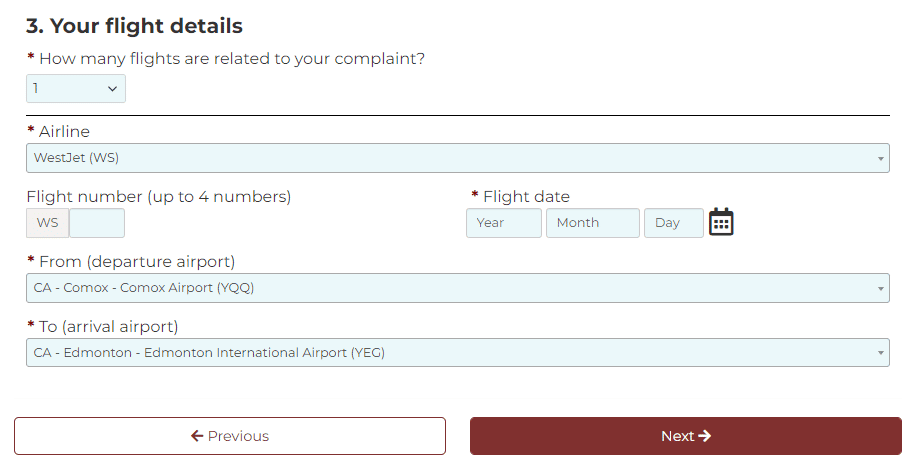
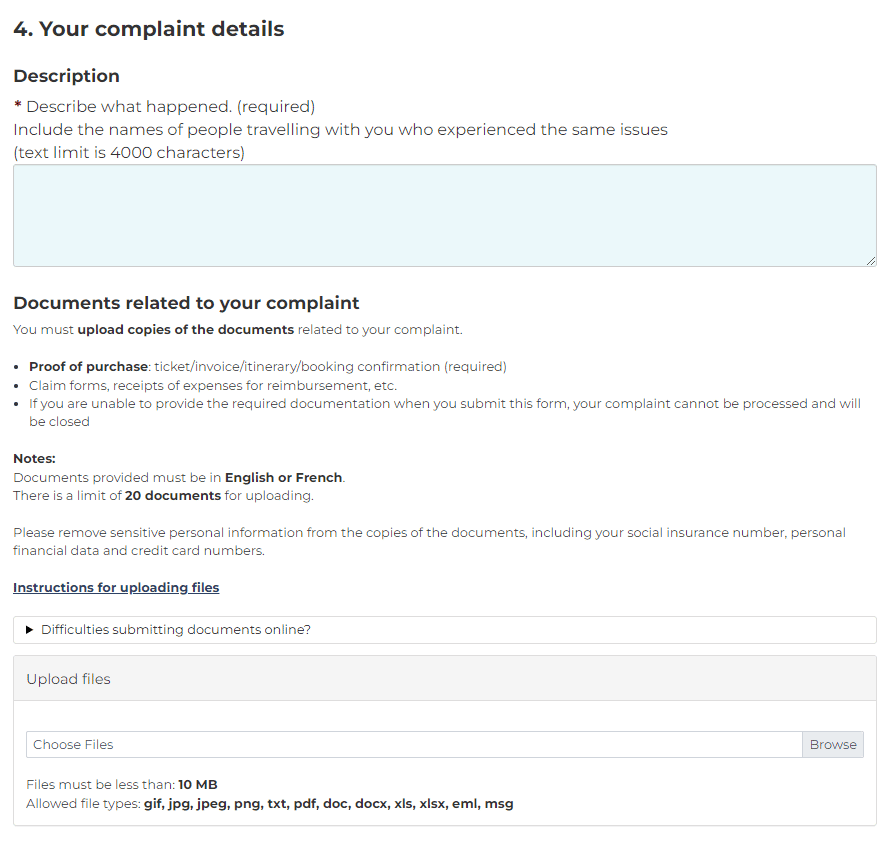
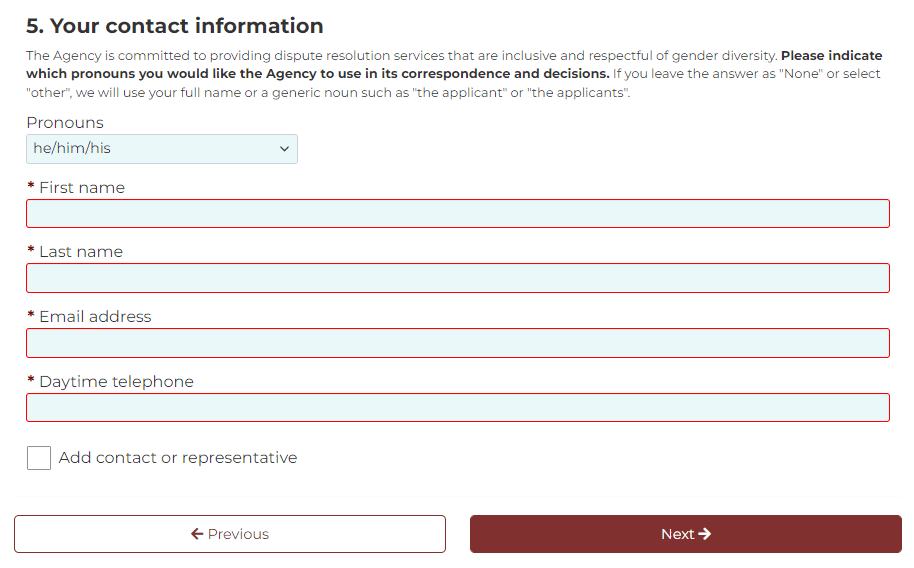
After you submit the form you must wait until a member of the agency reviews your claim. The agency will determine one of three possible resolution processes, as outlined below.
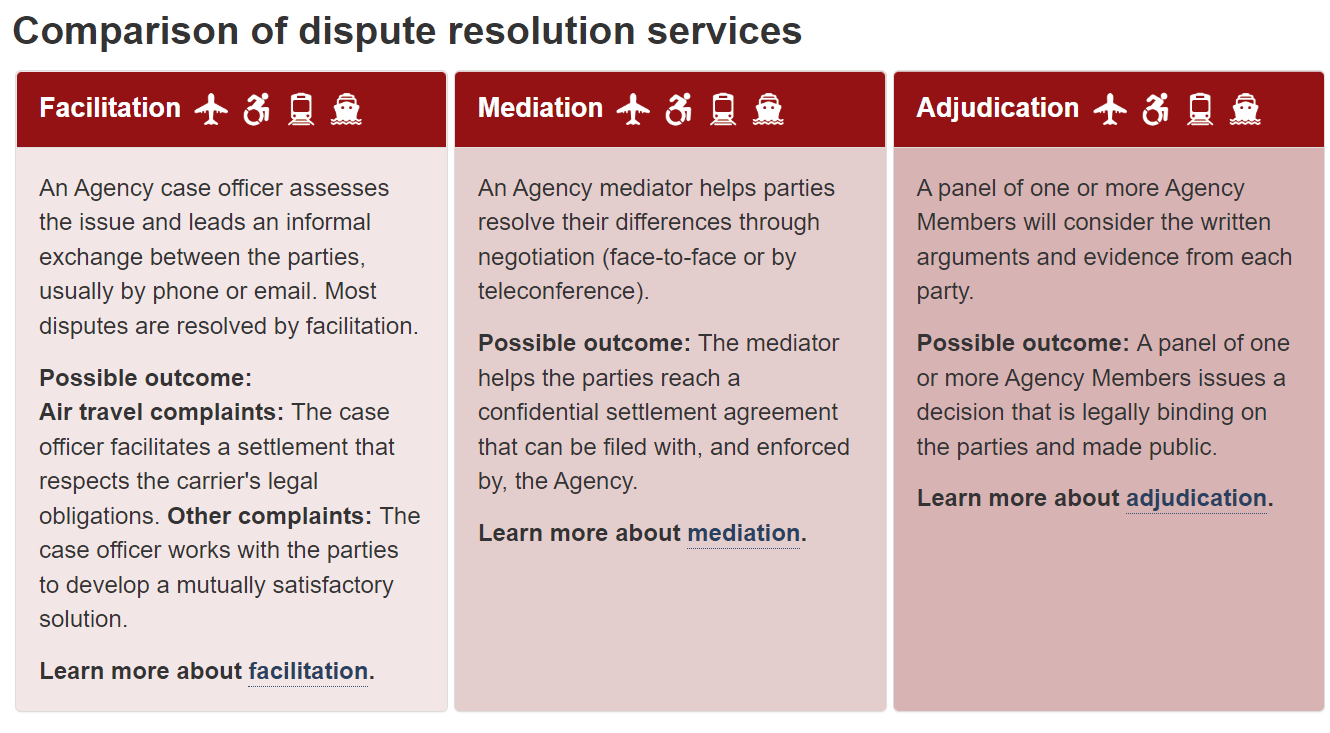
It can apparently take more than 18 months just to be reviewed by a CTA agent :/
Ultimately, if you choose to go through this process, you should be of the mindset that you will likely not get your compensation, but you might get a nice bonus to your travel bank in 1.5-2 years’ time.
Alternatively, you can go through the more drastic measure: civil action, otherwise known as small claims court.
Escalation Option 2: Take Civil Action Against an Airline (aka Small Claims Court)
Civil action involves engaging with the legal system at the provincial level. Of course, the legal system is complicated even at the small claims level. As travel bloggers, we can’t claim to be experts on this subject and what follows shouldn’t be misconstrued as a replacement for sound professional legal advice.
However, for small claims, it often doesn’t make sense to pay expensive legal fees, and many people do go through this process on their own (DIY). Therefore, below we outline the process of initiating a civil action, generally and also province-specific.
A best-case outcome of small claims is that the airline will settle with you before going to trial (yes – just like all the lawyer tv shows tell you), and simply pay you what you asked for or some other amount it deems appropriate. However, you shouldn’t rule out that you may need to go to court and present your case. The airline can also counter-sue you for costs it has to incur in taking legal defensive action. Keep these things in mind.
General Process

Step 1. Complete the Claim Form
Each province has a different name for this form, including the Claim Form, Civil Claim Form, Small Claim Form, Statement of Claim, Plaintiff’s Claim, and so on.
In this form, you will fill out information about yourself, the plaintiff, as well as the airline, and the defendant. You must properly name the defendant to a tee, or you may never be able to claim your money even if you win the case.
In the case of airlines, we are dealing with corporations and so can defer to the corporate registry in your province to determine the full and correct name, as well as the address for service.
Air Passenger Rights (airpassengerights.ca) has already done the legwork here with a directory of documents: Air Passenger Rights | Airlines. In that directory, you can find the Address for Service for most airlines and for most provinces.
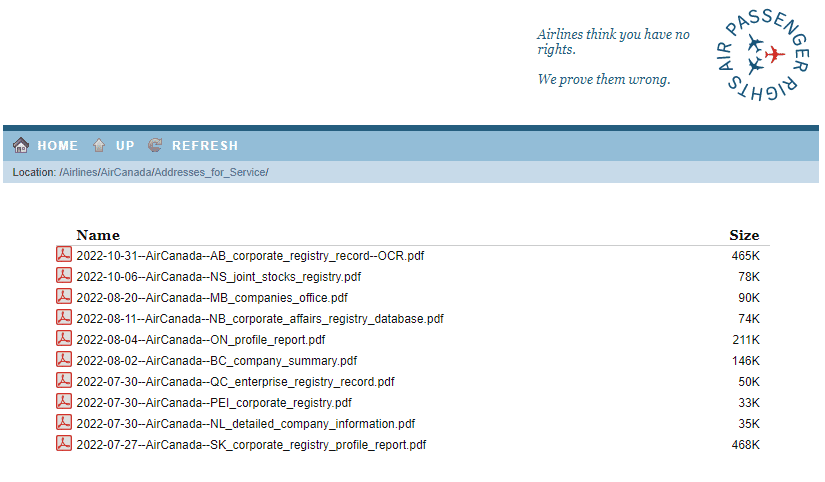
In addition to naming the defendant, you will be asked to provide your description of the incident, as described above.
Step 2. File the Claim Form and Pay the Filing Fee
The claim form must then be filed with the provincial court. This again varies slightly by province, with some requiring you to visit a physical courthouse, and others having online forms or fax numbers for submitting documents.
You will also need to pay a modest fee for filing, ~$100 for most provinces. Note that this fee is recoverable – you can include it in your list of damages (distinguished as ‘costs’) to be paid by the defendant.
Once you file the claim, the court will provide you with copies of your filed claim as well as another document (sometimes called a dispute note, defense form, reply form, etc), which allows the defendant to submit their response.
Step 3. Serve the Claim Documents to the Defendant
You must now deliver (‘serve’) the documents to the defendant. Use the registered address for service in your province, or the head office if none is available.
The documents can be sent via mail, however, ensure to get a receipt upon sending the documents from Canada Post.
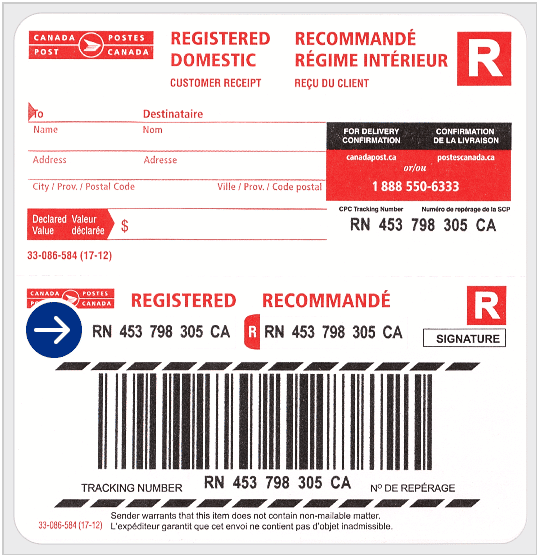
Finally, you will complete and file another document called an Affidavit of Service, which attests that you served the defendant the documents, and includes the attached receipt for mailing.
Step 4. Wait for a Response from the Defendant
Now, you wait for a response from the defendant, which is typically allowed 20-30 days depending on the province.
If you’re lucky, you’ll get a settlement offer, otherwise, they may file a dispute and then you’ll have to move forward with the trial process as outlined by your province’s small claims court.
Conclusion
Airline delays and cancellations are no fun on their own, but a passenger should never be out of pocket as a result of an airline’s blunder.
It is my hope that this article, in combination with the highly helpful Facebook community Air Passenger Rights (Canada), will make the avenues for seeking compensation more clear. If more passengers pursue these escalation channels, perhaps we will see airlines start to act in accordance with the APPR more religiously.
We will continue to update this resource with more information as we dive deeper into the APPR, CTA, and small claims process. This article is by no means all-encompassing, and so we welcome any experiences, comments, questions, or suggestions from the travel community!
Frequently Asked Questions
To receive compensation for a flight disruption, such as a flight delay or cancellation, you must make a claim with the airline in writing within 1 year of the incident date.
There is some debate on this, and it gets a bit complicated. The CTA has three types of dispute resolution – facilitation, mediation, and adjudication. If the resolution process advances to adjudication, the result is a legally binding judgment, which means you cannot then pursue another legal avenue such as civil court for the same if you are unsatisfied with the outcome given by CTA.
Initiating the CTA process and a civil claim would be unorthodox then because you’d be initiating two different processes that have the potential to conflict from a legal perspective. Additionally, given that the CTA’s turnaround time is up to 18 months, it’s my opinion that those planning to go through civil claims would derive no benefit from also submitting a complaint to CTA. Civil claims will get you a fairer and faster resolution.
That being said, my understanding is also that in the CTA dispute resolution process you will be given a chance to agree or disagree to further escalation (to adjudication). So it might be an option to initiate a complaint with CTA and then abandon it if it doesn’t prove fruitful at the facilitation or mediation steps and instead pursue civil claim (but again, this seems redundant to me – in most cases I would recommend to just start with civil claims).
The address for service for Air Canada for each province can be found here.
Thank you to the Air Passenger Rights (Canada) Facebook group for this resource.
The address for service for WestJet for each province can be found here.
Thank you to the Air Passenger Rights (Canada) Facebook group for this resource.
Incurred fees will depend on your jurisdiction (province), and the final outcome of the case. You will pay at minimum: $100-$150 for filing the claim. If the defendant doesn’t respond, you may pay an additional fee to request a default judgment. Similarly, if you end up going to trial there will often be additional fees.
However, note that most legal fees are recoverable meaning you can request the defendant to compensate you for the costs. This hinges on your case being successful of course.
An affidavit of service is a legal document that affirms you have served the defendant (i.e., notified them of the claim/court case). It’s the next step after you file the claim with the courthouse.
Reed Sutton
Latest posts by Reed Sutton (see all)
- Award Flight Search Tools Compared: AwardTool, Point.me, PointsYeah, Roame, Seats.aero - Apr 22, 2024
- The Best Luxury Lodges for Wildlife and Wilderness Lovers - Mar 4, 2024
- Welcome to the Frugal Flyer Team, Andy - Feb 20, 2024
- Update on IRS Processing of Certified True Copies of Canadian Passports - Jan 20, 2024
- Best Balance Transfer Credit Card Offers in Canada - Jan 15, 2024

Thank you for the information, it is greatly appreciated.
Hello Reed and thank you for the information and for this forum. We were set to fly direct in June from Hartford, CT to Toronto at 10am- stay two nights to visit family and then fly direct from Toronto to Victoria for 8 nights. We were notified at 9pm the night before the Hartford departure that our flight was canceled and then notified that we were rebooked to the next day- defeating the purpose of traveling to Toronto in the first place. That next morning we drove to Toronto. As we prepared for our flight to Victoria, we were notified 12 hours in advance that our flight was canceled. We were rebooked to a flight that connected through Vancouver to Victoria which was manageable. Three hours before we were scheduled to depart we were notified that the flight had been canceled and that we were rebooked to a flight that connected through Montreal connecting to Victoria 12 hours after our original landing time.
Since we had three flights canceled that meet the ($1000 per flight) criteria defined in APPR, do we have three valid claims?
I also filed to be reimbursed for mileage (948 miles @ the US IRS reimbursement rate of $.685 per mile) , tolls ($56) and meals ($62) for our car travel from Hartford to Toronto. Is it conceivable that we might be successful in that claim even though we do not have receipts. The mileage and tolls can be verified easily. The meals would be out of the kindness of Air Canada’s heart as we didn’t keep receipts. We didn’t incur lodging expense as we stayed with family as originally planned. Thank you!
Hi Reed,
Can you provide any info in regard to my previous questions?
Hey Tim,
With the Hartford to TO flight, did you get a refund since you declined the rebooking?
My best interpretation would be that you have potentially two claims per person. I do not believe that you can make an APPR claim for the same initial flight that was then rebooked and cancelled, and “double dip” so to speak. Because the compensation is based on the delay between your initial scheduled arrival time and actual arrival time. I could be wrong though, and if it were me I would certainly try filing a claim for all of them.
As far as other expenses go, yes I would just submit them and see if they go through. They may ask for receipts.
Hi Reed- Thanks for your response and for hosting this platform. We did get refunded for the Hartford to Toronto flight. My thought is that, regardless of that fact, our arrival was delayed by more than 10 hours due to the AC cancelation of our flight.
To give you an update, we did file for all flights. AC has said that they are reimbursing us $1,000 each. I believe they are only paying for one flight because of the reimbursement for the first leg. AC has also said that they are not reimbursing us for out of pocket expenses as they are related to the first leg and because we do not have receipts- regardless of the fact that all items that we are claiming are verifiable (mileage and tolls) except the $65 that we spent on food and for which we didn’t keep receipts.
I am wondering if it is worth the hassle of filing with CTA to attempt to enforce APPR for the first flight and for the reimbursement of out of pocket?
Hi Tim,
Yes, I think its a good case for a CTA complaint vs a small claims. Nothing to lose, the process is pretty quick to complete.
Hi Reed- I am going to follow through with the CTA complaint. Assuming they send payment, should I refrain from cashing any checks until the outcome of the CTA complaint is complete- or does it matter?
CTA can take over 12 months so I wouldn’t wait. Also you won’t receive additional APPR compensation for whichever flight you already received compensation for.
Reed,
After sending my last response I went back to review my communications with AC. The reason that they are denying reimbursement for the second flight is based on their assertion that the delay was outside of their control. I checked the texts that we received at the time to notify of of cancelations. Hartford to Toronto was claimed to be “ground handling constraints”. Both of the Toronto to Victoria canceled flights were claimed to be “unforeseen aircraft maintenance issue”.
Thanks Reed- I’ll update you once there is a final resolution, whatever that may be?
Hi Reed,
Thank you for all of this work.
Do you know…if I file a small claims action…are my damages limited to my out of pocket expenses or can I sue for (include in the damages) the amount of compensation that I have been denied under the APPR regime ($1,000.00).
In other words, I am a party to the APPR “contract” by virtue of just being a passenger?
Thanks !
Hey Mike – I would definitely include the denied compensation for APPR in your claim as that is a big reason you are going to small claims. In addition to the legal fees incurred and any additional out of pocket expenses you incurred due to the delay. Doesn’t mean everything you claim will be awarded if you win, but no point leaving anything on the table so to speak.
How do you service documents for small claims court if you’re in a different province? For example, I am in Ontario trying to serve Westjet. Do I send registered mail to 525 8th Avenue, 2400, Calgary, Alberta, Canada, T2P 1G1?
Q: if i’m going to the hassle of suing Westjet to get reimbursed can i get damages? Any history or examples of what would be reasonable? Thanks
Would you have West Jet Vacations, not West Jet Airline, registration/business number? What address do I need to service for West Jet Vacations? I assume since the trip was starting in BC I can take them to court in Vancouver. I understand their location/head office is in Alberta.
WestJet is the parent org of WestJet Vacations, but I would recommend to ask this question on the fb group to get a second opinion.
Yes you can file with your provincial government’s courthouse.
We had a Westjet Vacations package that I’m trying to get reimbursed for ( see below ). Did you find out if you need to sue Westjet or West Jet Vacations? thanks.
Hi,
1. We booked an (anniversary) 4 night package trip to Cancun with Westjet Vacations through Selloffvacations.
2. While at the airport they cancelled the flight WS2580, due to not enough crew . Gate agents said if was their fault.
3. We are sent a rescheduling email from WS putting us on a Monday flight. ( we were to return Wednesday)
4. Gate agents said to also let the “package provider” know what’s happended. I assumed that was Westjet vacations. Took hours to get through to an agent ( i eventually left a call back) , they informend me that i need to call Selloffvacations.
5. i call Selloff and explain, they say we need to call WJ vacations and would be back.
6. Sell off calls back and says that we are only entitiled to the “flight portion” and not the hotel etc.
7. Eventually WJ Vacation, on the line with Selloff, tell me that we could take a flight that night from YYZ to LAX and then an overnight red eye to Cancun. We decline as it’s 2 days ruined of 4. WJ vacations says we’re out of luck then. That’s not “travelling on a similar route” is it? Also, called back WJ vacations and they WOULD NOT LET ME SPEAK WITH A SUPERVISOR. I’ve yet to see a flight refund. Can i sue WJ vacations or do i need to go after Selloff? I did complete the APPR. Thanks